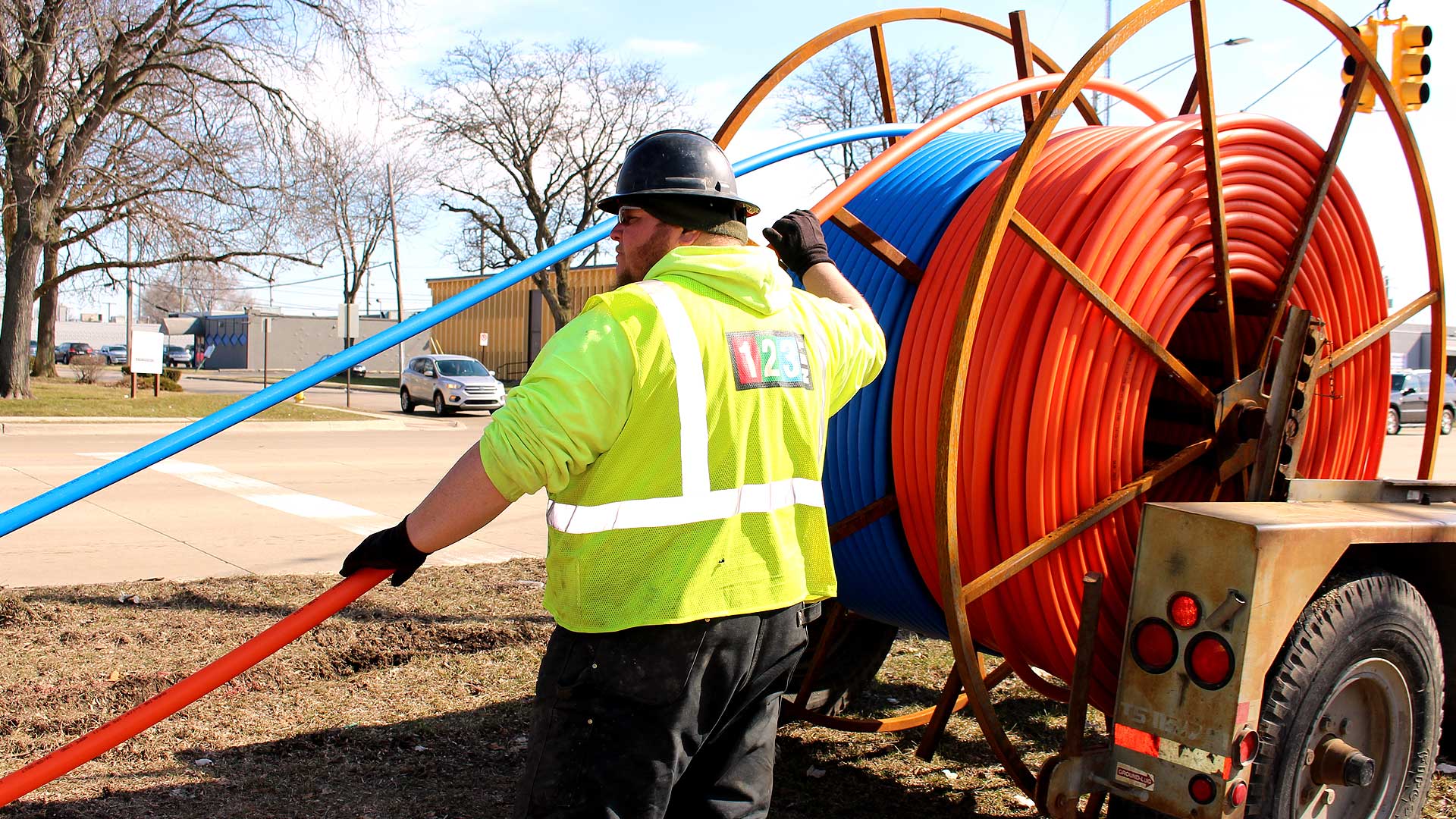At one point, Stephanie Calhoun was paying $400 a month for spotty mobile internet.
It was a “very unpleasant surprise” when Calhoun moved to Michigan in June 2020 and discovered she couldn’t access broadband internet at her Allegan County home.
“How did we get all the way to 2020 and not have a very basic utility available for people. How did that happen?” she said.
Calhoun, 39, and her family are one of an estimated 1.23 million Michigan households that don’t have a reliable, affordable internet connection. That includes 456,000 who don’t have any internet access, according to a 2021 state report.
This digital divide between haves and have nots leaves millions of Americans in rural and low-income areas without reliable internet for work, school or telehealth services. But Michigan is trying to bridge this gap with a windfall of federal dollars.
The state last year received more than $1.5 billion, the fourth largest allocation in the country, through the $42 billion Broadband Equity, Access and Deployment (BEAD) fund. Another $238 million is supporting the Realizing Opportunity with Broadband Infrastructure Networks, ROBIN, federal grant program.
That grant will help Allegan County reach its goal of bringing internet to 99% of households by 2025.
Related: 70,000 Michigan homes, businesses to get high-speed internet access
“Most people are going to be within a very short distance to the fiber backbone,” said Allegan County Broadband Project Manager Jill Dunham. “It makes it a lot easier to close those teeny gaps and make sure those people don’t fall through the cracks.”
Federal regulators currently define broadband as download speeds of 25 megabytes per second, but that “outdated” standard could be quadrupled under an inquiry launched last fall. Michigan views the digital divide as anyone who relies on satellite, mobile data or connecting to the internet at libraries, schools and businesses.
“I didn’t know that internet was an issue in parts of the country,” said Calhoun, who works as the executive director of the Allegan County Community Foundation. “Because my husband is retired Navy, we’ve lived in many parts of the country. We even lived on a tiny island off another island in the middle of the Mediterranean Sea with internet that was better than what we were getting here.”
The Calhoun family, who lives in Gun Plain Township, went to extremes trying to find a connection.
They first got two FireWiFi networks to supply internet for two adults working from home and three kids attending Zoom classes during the pandemic. This came with a steep bill and unreliable service. Calhoun could hear her high schooler trying to learn chemistry with choppy video and her middle schooler struggling to stay connected to a video class.
They eventually switched to a T-Mobile home internet, which Calhoun says is “better but not great,” for $50 a month.
“We’ve been able to work our way around the issues,” she said. “But just in general, the county, they’re at a disadvantage from not having access to information or telehealth.”
Population density and cost are the key reasons broadband has not been laid in rural areas.
“You have a road that only has 10 or 12 people per mile and they are only going to pay less than $100 a month. And you’ve got to put in fiber that costs like $25,000 to $50,000 a mile,” Dunham said. “The math doesn’t work out. You can never be profitable.”
Related: Beaver Island petitions FCC to require fiber internet for rural areas
Eighteen Michigan projects received dollars from the federal grant program last year to connect 70,000 homes and businesses to high-speed internet.
The highest grant of $28 million went to 123Net – a internet service provider that will install 1,100 miles of fiber throughout Allegan County over the next two years. The county earmarked $17.7 million of American Rescue Plan Act dollars to fund the $65 million broadband project. This was matched by $17.7 million from 123Net and supplemented by the ROBIN grant.
An estimated 11,024 addresses will be connected to broadband internet when the project is complete.
“It’s a light at the end of the tunnel,” Calhoun said.
Helen Goyings, a retired school teacher, was also surprised about the lack of internet after she and her husband moved into a newly built neighborhood on Big Lake in Watson Township seven years ago. It’s a quiet area – the nearest Meijer is seven miles away – that’s also bustling with deer, cranes and swans.
But Goyings, 65, estimates they live two miles from any broadband fiber.
“It’s an internet black hole,” she said.
Related: New broadband project manager working to improve Allegan County service
The Goyings currently rely on two Verzion Jetpacks – one with 150 gigabytes a month and another with 50 gigabytes – that cost up to $140 a month. Zoom calls regularly get dropped, the connection fails during bad weather and they always run out of internet before the month ends.
“I just never realized how much of a burden it would be,” she said about the lack of broadband.
Homes on Big Lake are expected to have broadband by April, according to 123Net, and Goyings is looking forward to having reliable internet that lasts an entire month.
Broadband is also an economic development tool that Dunham wielding carefully to protect the “beautiful rural county.”
“When you put internet in every home in a county as beautiful and fabulous as Allegan, there’s going to be huge demand,” she said.
Read more statewide coverage from MLive

Tyler Fields is your internet guru, delving into the latest trends, developments, and issues shaping the online world. With a focus on internet culture, cybersecurity, and emerging technologies, Tyler keeps readers informed about the dynamic landscape of the internet and its impact on our digital lives.


